Menu

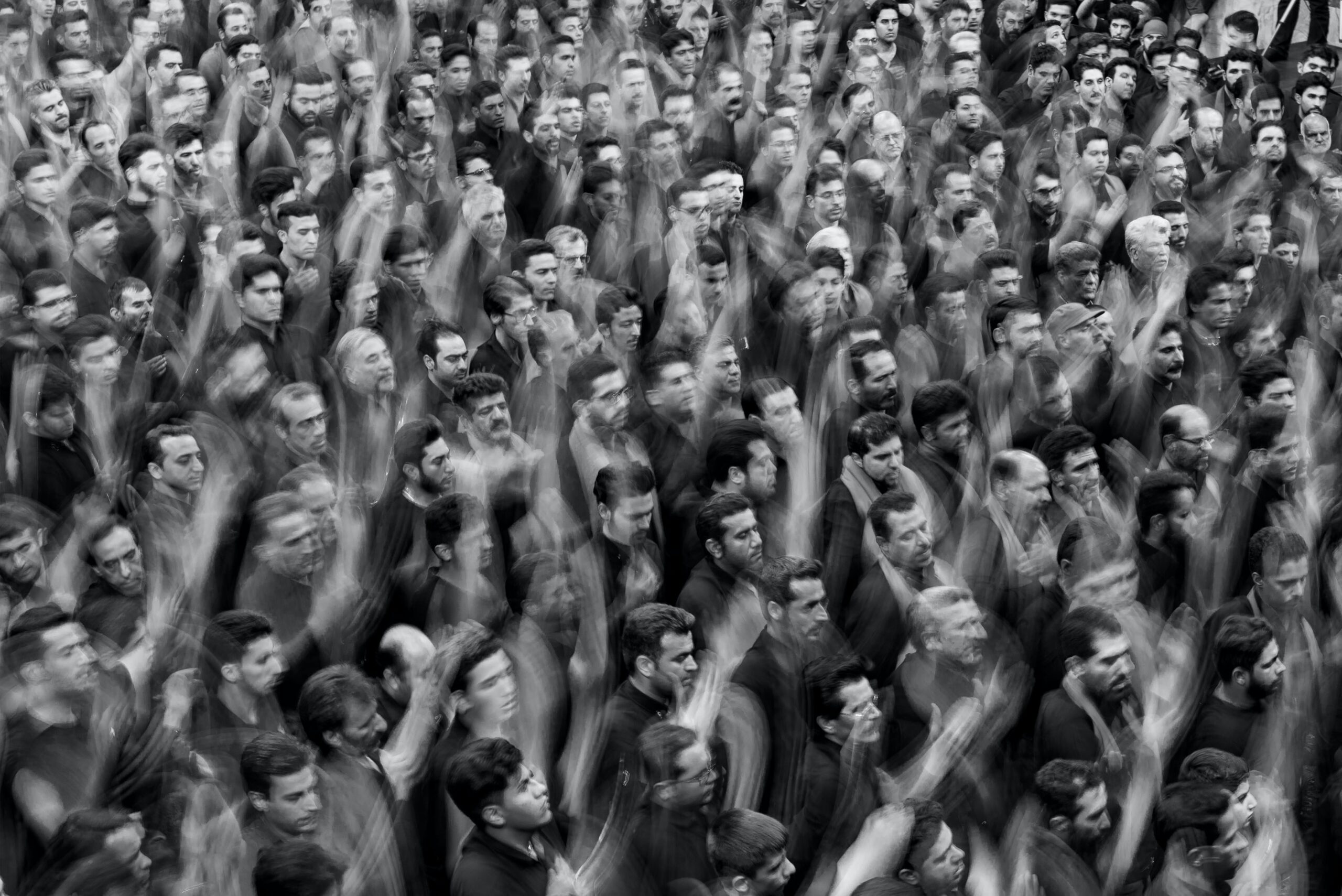
Without further ado, let’s pick up where we left off last week!
We ended the post on a series of questions, which we can now start to follow up on, and let’s start from one that focused on an outlier:
We can examine that question by isolating the stories where there was particular emphasis on the potential of businesses.
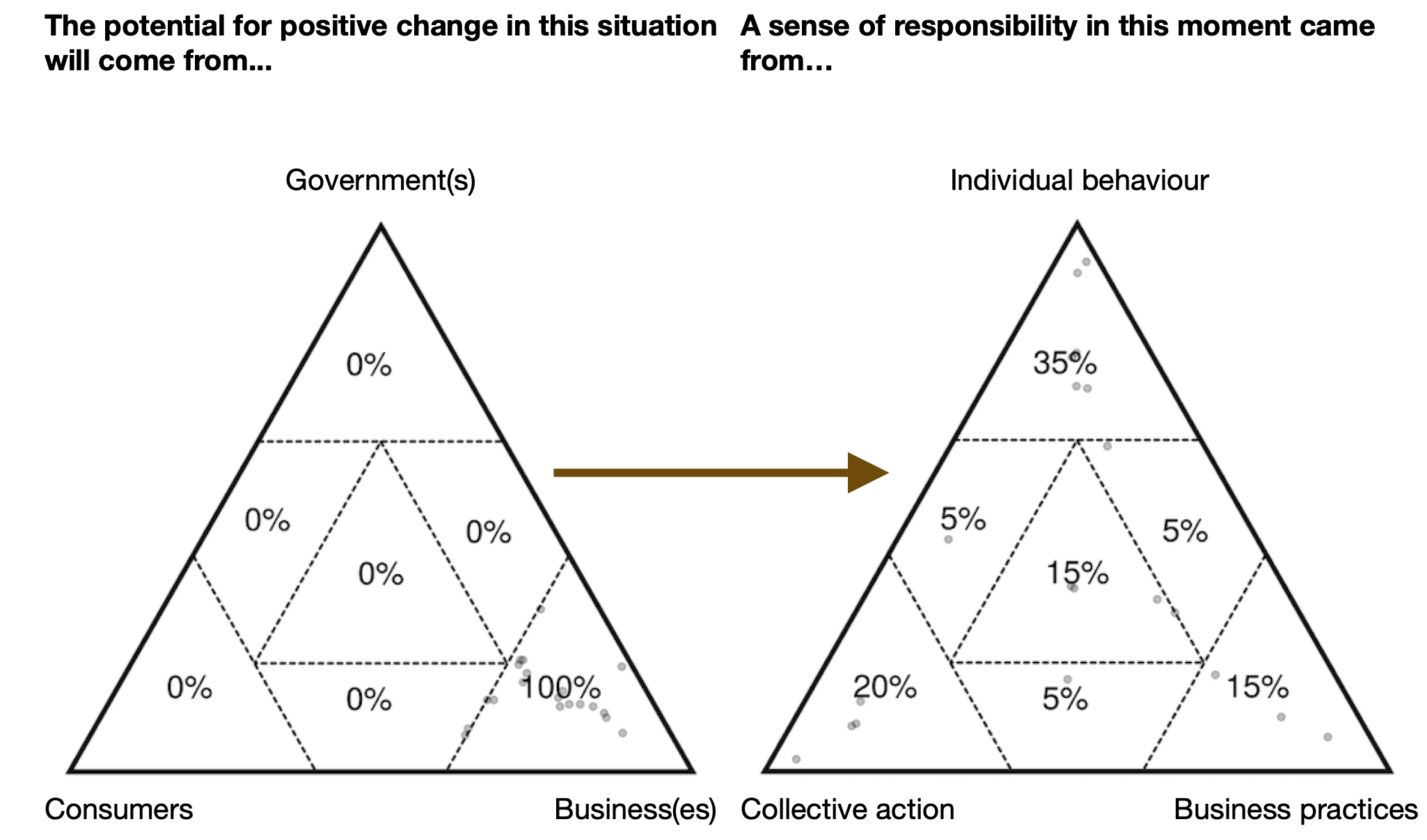
To save people the trouble of referring back to the previous blog in the series, this is what the overall pattern around responsibility looks like:
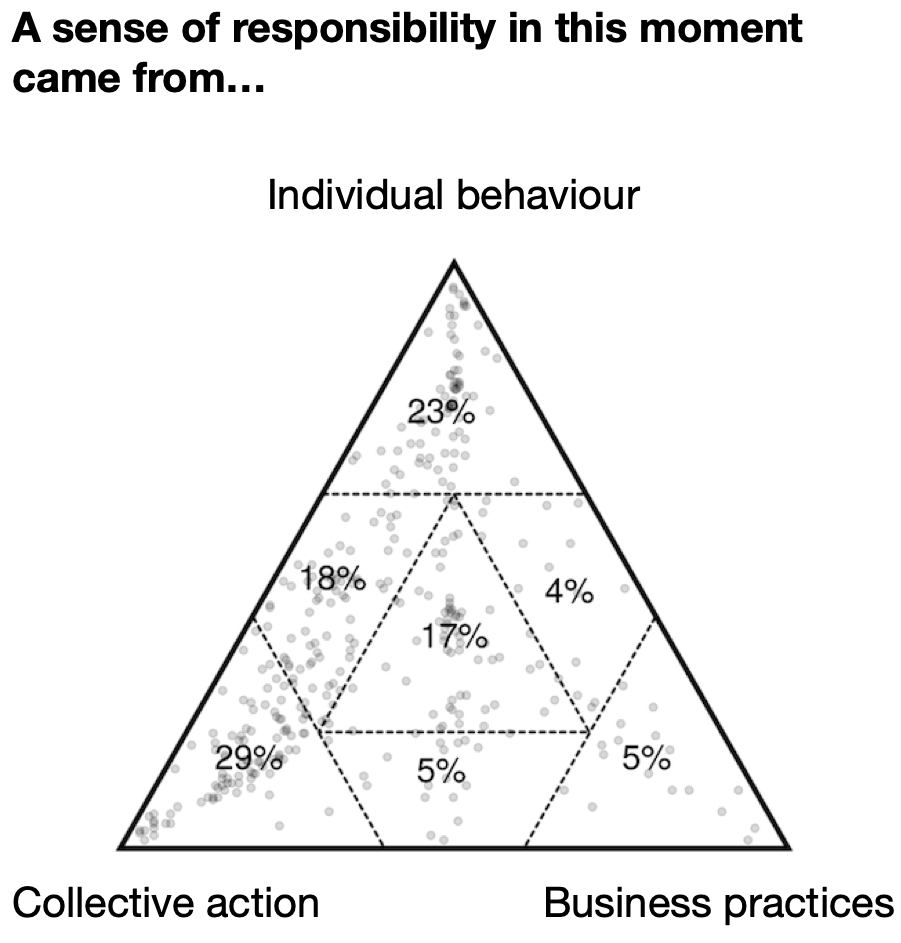
As we can see, people whose stories show a belief in the potential of business tend to emphasise more personal responsibility, less collective action and (unsurprising), more business practices.
Interestingly, the pattern of blame, (this could have been avoided if…) also shifts, in this case to emphasise the (negative) responsibility of business:
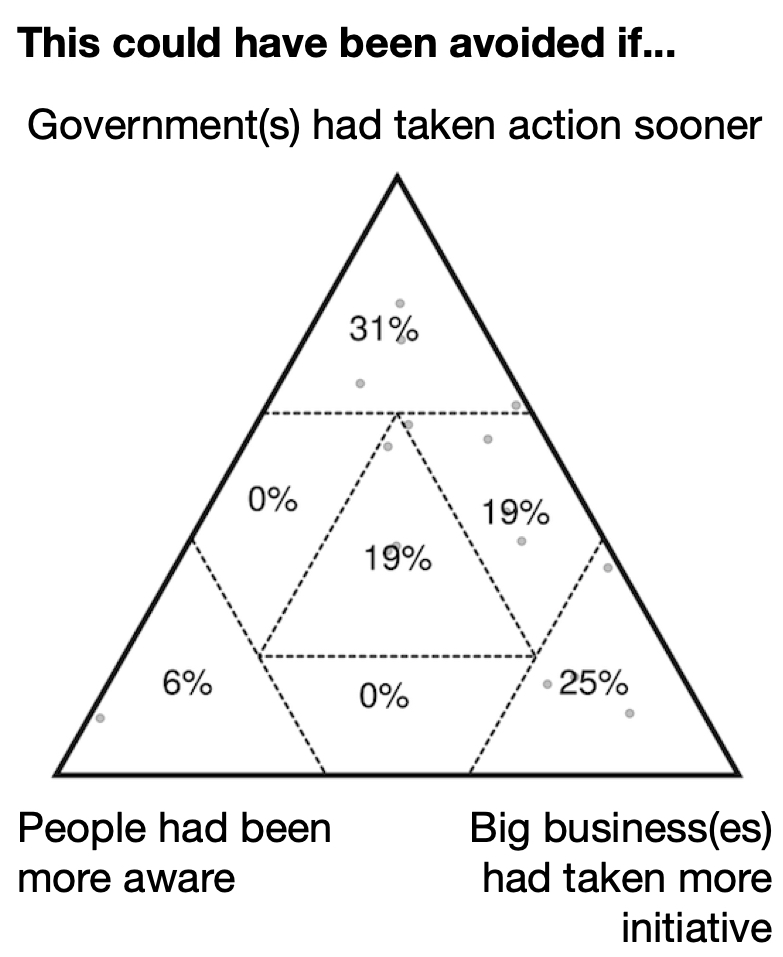
This confirms the suspicion expressed in the previous series that greater expectations of a player in the field of climate change are also associated with assigning more responsibility to them, whether positive or negative. It is also interesting here that when it comes to blame, individuals are actually considered less significant by those who signified their stories with an emphasis on business, even though they assigned more of a sense of responsibility to them. Governments here appear to carry a greater share of the burden for them.
Before we move on to another question, let’s take a look at the kind of thing that is seen as a positive potential coming from business:
A rapidly expanding biotech company is about to go public. The CFO is under great pressure and has an extremely tight timeframe. All employees are working on the fringes of what is possible. Nevertheless, the CFO has a clear position: the company should become climate neutral. However, resources are insufficient for such a project. Other issues are more important from a regulatory point of view. Nevertheless, according to the CFO: We are starting the project now! We have to act now!
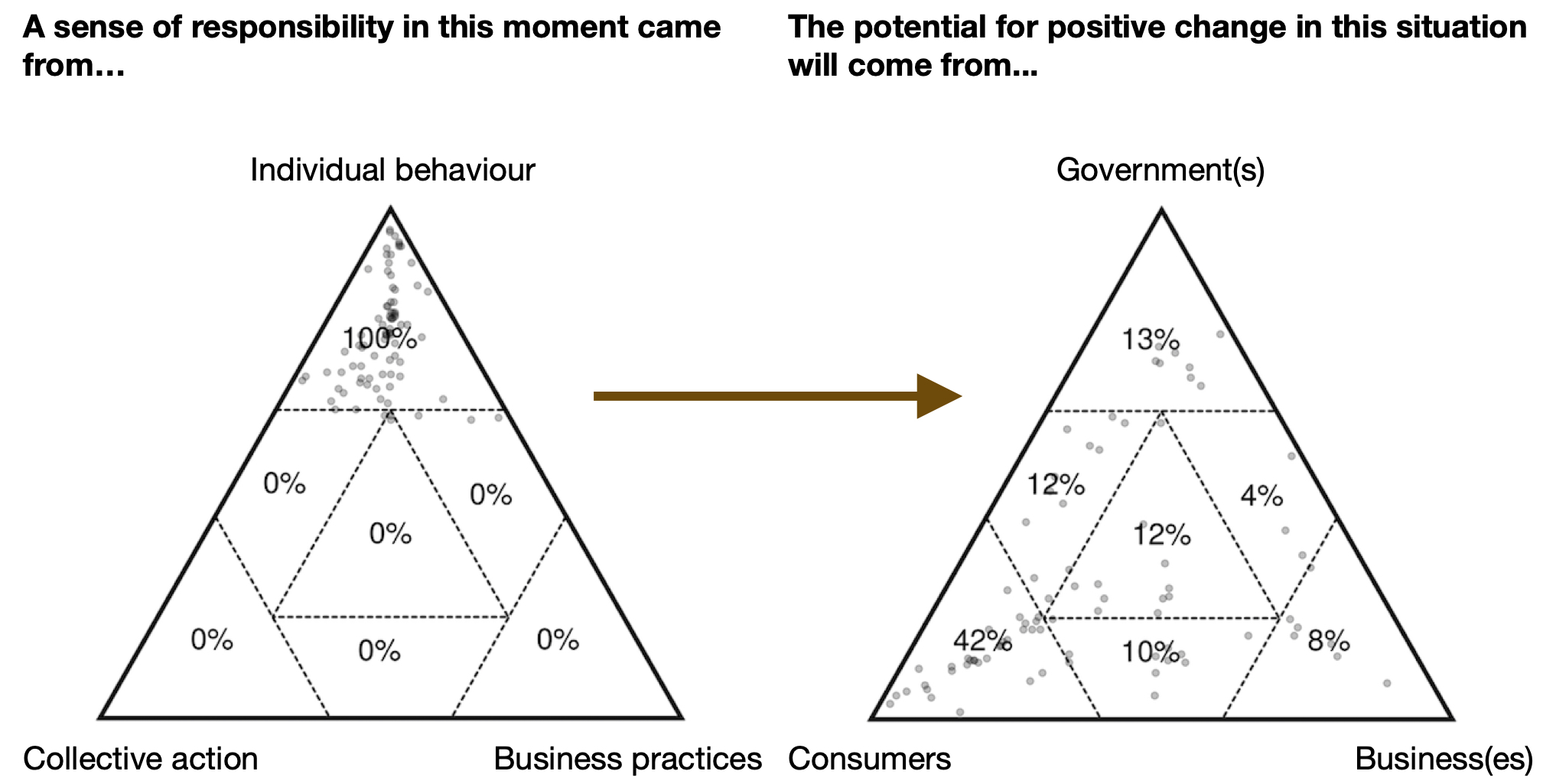
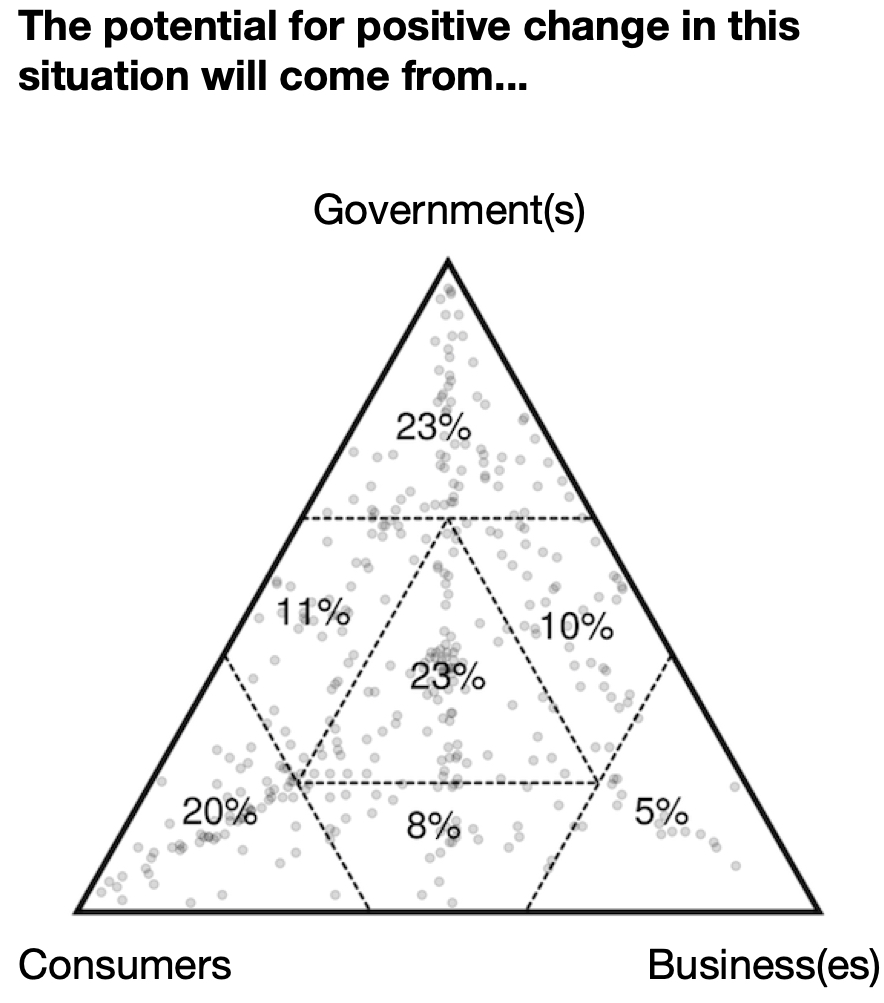
Again, reminding ourselves of what the overall pattern around potential looks like (to the right) we can confirm that an emphasis on individual responsibility does partially translate to a greater emphasis on positive capacity to create change. The shift in that pattern doesn’t affect the perception of business responsibility very much, but instead the shift happens between governments and individuals: more emphasis on individual responsibility means less positive expectations from governments, as well as a more emphasis on individual blame (not pictured).
This post has been very pattern-heavy so far, so in order to rest our eyes and reconnect with the human and contextual side of those patterns, let’s focus primarily on the stories to answer two more of the questions we raised at the end of the previous post:
These are some of the micro-narratives located in the pattern of collectivity:
The documentary ‘2040’ by Damon Gameau. I think we need to think more about what we can do now, and about doing it rather than drowning in depression.
Climate strike which take place from 20-27 September
This September, there was a wave of #GlobalClimateStrike youth climate marches around the world. The World Climate March was also held in Ukraine: more than 2,000 people came to Kyiv, so it hit almost all the media and received a significant public response. (Translated from the original)
These micro-narratives come from the cluster between individual behaviour and collective action:
Break free from plastic: it is a global movement to stop plastic pollution for good. It has a positive impact, and even more in the future (hopefully).The goal of the movement is a world where the land, sky, oceans, and water is home to an abundance of life, not an abundance of plastic, and that air we breathe, the water we drink and the food we eat is free of toxic by-products of plastic pollution.
My city continues to increase, and encourage, the use of bike infrastructure; riding, parking, incentivizing the use of bicycles for commuting and recreation.
Now that social media is such a big part of our day-to-day life, it is such an easy way to keep everyone connected but not only that but it can spread news very quickly sometimes bad and sometimes good. But I think all of the climate protests and people staying up recently shows people that there are people who care and that can sometimes spark things in others.
The proposal for a universal basic income US candidate Andre Yang or universal basic services (Labour Party UK). These act as cushions for people who leave high -carbon jobs whilst low carbon jobs appear on the labour market. Or if these jobs do not appear then some kind of collective arrangement where individuals involve themselves in low carbon solutions to provide for all.
In the next instalment of this series, we are going to focus on the question of time: the past, the future, and everything in between.
And as always, don’t forget our ongoing climate change MassSense.
In-line image by sasan rashtipour on Unsplash
Dear Reader, while we have your attention: we are on a determined drive to expand our network around the world. We’re certainly living in uncertain times (sic), and we believe that it will take a large collective of like-minded people to help organisations and societies navigate stormy waters, make sense of the world and make good decisions. Consider joining the Cynefin Network by clicking on the banner below. Links to eBook and paperback copies of our latest book are also available on this page.
Cognitive Edge Ltd. & Cognitive Edge Pte. trading as The Cynefin Company and The Cynefin Centre.
© COPYRIGHT 2024

We are now at the stage where we start to dig into the patterns and ...
This week we are looking at the dimension of time. Time is a central concept ...